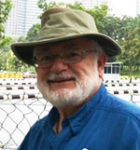
(c) Oliver Pollak
RICHMOND, California — American wedding vows typically include the line “Till death do us part.” But affection may wither and politics dictate otherwise.
We got married on May 8, Mother’s Day 1966. 52 years later, in 2018, our anniversary and Mother’s Day, May 13, are five days apart. These celebrations have been on the same day eight times. The next time is 2022. We have friends who have been married several times during the same period. We have friends who have been married 60 to 70 years. Our parents were married 36 and 51 years until one partner died. My mother was a widow for 39 years, my father-in-law a widower for 12 years. Neither remarried. They lived rich active single lives with loving children, grandchildren, greatgrandchildren and friends. They were the matriarchs and patriarchs of the family. Now Karen and I hold that position (notwithstanding that Ralph is older).
In the generation born in Europe and Russia, our grandparents and other uncles and aunts had different politicized marital experiences. My English born Jewish grandmother, Nellie Borgzinner married German born Felix Bachman in London at the Ethical Society in 1912. Soon after they moved to Hannover they had two daughters, Reni born in 1915 and my mother Ruth, born in 1921. Opa was decorated for his service in the German Army Medical Corps.
During the mid 1930s my grandparents separated, something that did not come up in conversation in the home. Nellie returned to England where she was the housekeeper for Hans Roger Madol, an exiled Jewish German antiquarian manuscript and bookdealer, biographer of royal families, and diplomat for Luxemburg. Madol died in 1956 and bequeathed the Hermitage, his house in Richmond, to Nellie who died in 1960. My aunt and mother left Germany during the latter 1930s.
My father, born in 1903, married a Gentile in Vienna or Paris, and that marriage came to an end in the 1930s, something that did not come up in conversation in the home. My father had four sisters. Some made similar politically incorrect marriages, separated, divorced, and remarried in England and America. Assimilation and the higher culture of cosmopolitanism were a deadly delusion. They all left Austria during the 1930s, making their way to Palestine, England, and New York.
The Nazi empire labeled offspring of Jewish gentile parents as mischling (mixed blood). America’s eugenic anti interracial miscegenation customs were toppled by Loving v. Virginia (1967). The Constitution and privacy buried those ideas under the rubble of the past. Most of our friends married spouses of the same faith. In the early 20th century a mixed marriage was an Orthodox man marrying a Reform woman. Biracial and mixed race children, once somewhat unusual, has been common for decades.
Some marriages were blessed from the outset. Some friends of the bride and groom were saddened as couples split up. Karen is a frequent and loyal patron of Hallmark, American Greeting, and Papyrus, made in America, China and the Philippines. There are untold greeting card manufacturers in America. For our anniversary Karen dusts off and reuses old cards. I like to take scissors to colored construction paper. We laugh.
Our children infrequently send us greeting cards in the mail. When we lived 1,700 apart they sent more. They may call us on the special day, or send an oops sorry late message by email the following day. They do occasionally send sweet funny postcards. The use of Get Well cards is in serious decline or a function of general good health. Karen’s cousin Judy unfailingly sends cards for birthdays, anniversaries, Passover, New Year, and other family events to us and our children and grandchildren. It’s quite a kick. She does not do email. If her practices were more common the post office would probably not have just lost $1.3 billion.
*
Pollak, a professor emeritus of history at the University of Nebraska at Omaha, is a freelance writer now based in Richmond, California. He may be contacted via oliver.pollak@sdjewishworld.com